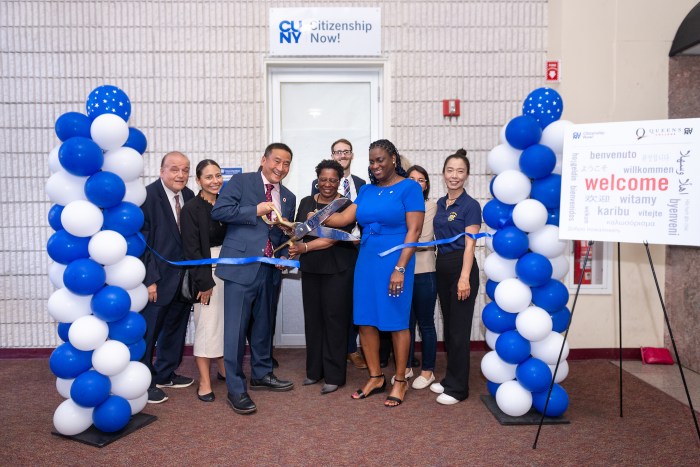By Courtney Dentch
The age-old battle of the budgets waged every year between city and state leaders got off to a rocky start last week as Mayor Michael Bloomberg and Gov. George Pataki unveiled widely differing plans to close multibillion-dollar gaps but still fund essential services.
Even though both are Republicans, political observers said, Pataki undercut Bloomberg by failing to propose several sources of revenue the mayor had been counting on to help staunch the city’s hemorrhaging red ink.
Bloomberg is looking to the recently hiked property tax, a hoped-for reinstated commuter tax and an increase in parking tickets to fill the city’s projected $6.4 billion deficit. But Pataki is set against what he calls “job killing” tax increases and wants to trim the money from public and higher education, Medicaid, and state agency operations to eliminate the state’s two-year $11.5 billion gap.
Bloomberg was hoping to find help for the city books from Pataki by asking for more than $1 billion in revenue from a new commuter tax, which would restructure the city’s income tax policies to tax employees based on where they work, not where they live.
“This is an absolute necessity for the city going forward,” said Bloomberg as he testified before the state Legislature Monday. “It is another way that the people of New York City — both residents and those who make their living here but live elsewhere — will pay the cost of what we enjoy without asking the rest of New York state to do so.”
In Pataki’s budget address, made a day after Bloomberg’s proposal, the governor rejected tax increases as a way to close budget gaps.
“High taxes are the surest way to weaken the economy and drive jobs across New York’s borders,” Pataki said. “Let’s take the option of raising job-killing taxes off the table on Day One of this year’s budget process.”
Bloomberg also proposed tolls for East River crossings to bring in $200 million, which would require state approval. Pataki did not include the tolls in his budget, unveiled Jan. 29, and he has said he is against the tolls.
Instead Pataki has proposed a $1.2 billion cut to education, eliminating prekindergarten and after-school programs and reducing the teacher training and retention fund. About $450 million of the cutback would come from city schools.
“As someone who was educated in New York’s public schools — and as a father whose children have benefited greatly from our excellent public school system — the last thing I want to do is reduce spending on education,” he said. “However, the crisis is that bad. We have no choice.”
Pataki has proposed $1.2 billion in revenues for New York City, which includes an offer of $500 million that the Port Authority owes on back rent for Kennedy and LaGuardia airports. Bloomberg has asked the bistate agency to cough up a total of $690 million in back leases and $90 million a year after that.
Despite the political back-and-forth, both the mayor and the governor are trying to cooperate while getting the best results for the people they represent, said City Councilman David Weprin (D-Hollis), who chairs the powerful Finance Committee.
“Traditionally the mayor and the governor represent different constituencies,” he said. “The mayor has to do what’s right for the city. The governor has the whole state to worry about.”
Reach reporter Courtney Dentch by e-mail at TimesLedger@aol.com, or by phone at 1-718-229-0300, Ext. 138.
































